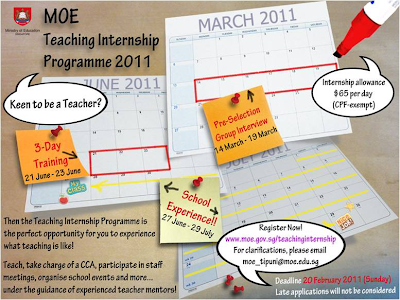
Application for Teaching Internship Programme 2011
I am a 2nd year undergraduate in the National University of Singapore majoring in Food Science and Technology. I enjoy learning new things and teaching my peers on things that they do not understand. Hence, I read with great interest of the Teaching Internship Programme, which introduces undergraduates to teaching as a career. I wish to take my interest in teaching to a higher level through this internship and test my ability to take up teaching as a career.
Most of the peer teaching I have done was on a one-to-one basis. Recently this month, I conducted a peer-teaching lesson for my class as part of a group of four. It was a good and satisfying experience, and it had given me more confidence to attempt going beyond peer teaching as I was used to. Teaching a group of people was unlike teaching one-to-one. I had to spread out my attention and this made challenging to connect with the whole class, to understand their progress. I would like to take on this challenge again through this teaching internship.
I have personal interest in the subjects of physics, IT, Biology, Earth Science, and Mathematics, but struggle to juggle between breadth and depth. Notwithstanding, having an interest in multiple fields of studies helped me better appreciate the things I experienced and came across in life, and I hope to help the younger generation do likewise as a teacher. As a peer-teacher, I am very patient and flexible; when my peers were not able to understand what I was saying, I would attempt to bring the idea across differently until they understood the idea, by using different words, analogies, illustrations, et cetera, according to the situation at hand. I get a strong sense of satisfaction when I succeed eventually.
I have personal interest in the subjects of physics, IT, Biology, Earth Science, and Mathematics, but struggle to juggle between breadth and depth. Notwithstanding, having an interest in multiple fields of studies helped me better appreciate the things I experienced and came across in life, and I hope to help the younger generation do likewise as a teacher. As a peer-teacher, I am very patient and flexible; when my peers were not able to understand what I was saying, I would attempt to bring the idea across differently until they understood the idea, by using different words, analogies, illustrations, et cetera, according to the situation at hand. I get a strong sense of satisfaction when I succeed eventually.
I hope to get a valuable chance to experience and take on the challenges of teaching through this teaching internship. Please feel free to contact me by phone at #, or by e-mail at #. Thank you for your consideration, and I look forward to your reply.

The start of the Twenty First century is here and the European Community is still struggling to shake off the latest in a series of economic recessions. Poor communication has often been blamed for holding back the expansion of business. The European Parliament has recently commissioned a study into ways of improving efficiency.
Although English was adopted as the first language of the EC back in 1971, it has always been recognised that English spelling is unnecessarily difficult. This becomes clear when we consider the words ‘chough’, ‘plough’, ‘rough’, ‘through’ and ‘thorough’. Officials in Brussels have therefore agreed that there is a need for a phased programme of changes to iron out these anomalies. A high level committee is being set up to staff these changes.
After the first year of the programme, the committee is likely to suggest using ‘s’ instead of the soft ‘c’. Sertainly, sivil servants in all sites will resieve this news with joy. The hard ‘c’ will probably be replaced by ‘k’, sinse both letters are pronounsed alike. Not only would this klear up konfusion in the minds of klerikal workers, but one key kould be saved on komputer keyboards.
Enthusiasm is expekted to grow in the sekond year, when it will be announced that the troublesome ‘ph’ will henseforth be written as ‘f’. This will make words like ‘fotograf’ 20 per sent shorter in print. The move will also please fysiologists and fysisists.
In the third year, publik akseptance of the new spellings kan be expekted to reash the stage when more komplikated shanges are possible. Goverments will enkourage the removal of double leters, whish have always ben a deterent to akurate speling.
We would al agre that the horible mes of silent ‘e’s’ in the language is disgrasful. Therefor, we kould drop thes and kontinu to read and writ as though nothing had hapend.
By this tim, it wil be four years sins the skem began and peopl wil be reseptiv to steps sush as replasing ‘th’ by ‘z’. Perhaps zen ze funktion of ‘w’ kould be taken on by ‘v’ vich is, after al, half a ‘w’. Shortly after zis, ze unesesary ‘o’ kould be droped from words kontaining ‘ou’. Similar arangments vud, of kors, be aplid to ozer kombinations of leters.
Kontinuing zis proses yer after yer, ve vud eventuli hav a reli sensibl riten styl. After tventi yers, zer vud be no more trublsm difikltis und evrevun vil find it ezi to understand each ozer. It is apropriat zat in 2008, ze yer of ze Uropen Trety, ze komunity shud be takink vun mor stp tovards unifikation.